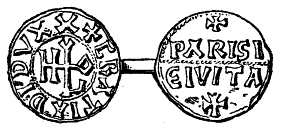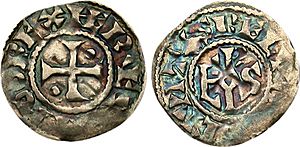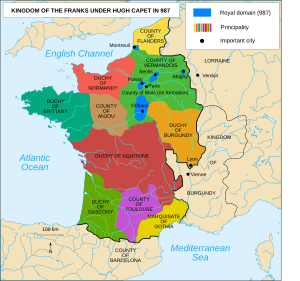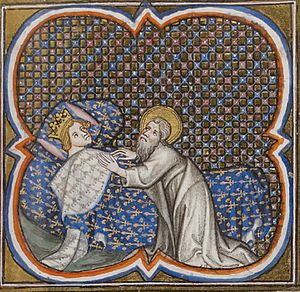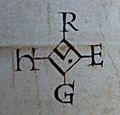Hugh Capet facts for kids
Quick facts for kids Hugh Capet |
|
|---|---|
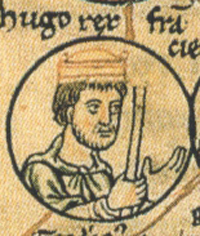
Hugh Capet in the 13th century Chronica sancti Pantaleonis
|
|
| King of the Franks (more...) | |
| Reign | 3 July 987 – 14 October 996 |
| Coronation | 3 July 987, Noyon |
| Predecessor | Louis V |
| Successor | Robert II |
| Born | 939 Paris, West Francia |
| Died | 14 October 996 (aged 56–57) Paris, France |
| Burial | Saint Denis Basilica, Saint-Denis, France |
| Spouse | Adelaide of Aquitaine (m. 969) |
| Issue | Hedwig, Countess of Mons Gisèle, Countess of Ponthieu Robert II, King of the Franks |
| House | Robertian dynasty Capet (founder) |
| Father | Hugh the Great |
| Mother | Hedwige Liudolfing |
| Signature | 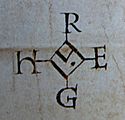 |
Hugh Capet (born around 939 – died October 14, 996) was the King of the Franks from 987 to 996. He is famous for starting the House of Capet, a very important royal family in France.
Hugh was the son of a powerful duke named Hugh the Great. His mother was Hedwige of Saxony. He was chosen to be king after the last Carolingian king, Louis V, died. Hugh was related to famous rulers like Charlemagne and Otto the Great.
The family Hugh started, the Capetian dynasty, ruled France for a very long time. They were in charge from 987 to 1328 directly. Even after that, other branches of his family ruled until 1848.
Contents
- Hugh Capet's Family Background
- How the Robertians Grew Powerful
- France in the 900s
- Germany's Influence on France
- Hugh Becomes Duke of the Franks
- Hugh Helps the Archbishop of Reims
- Louis V's Short Reign
- Hugh Becomes King of the Franks
- Disagreement with the Pope
- How Much Power Did Hugh Capet Have?
- Hugh Capet's Legacy
- Marriage and Children
- The Prophecy of Saint Valery
- Images for kids
- See also
Hugh Capet's Family Background
Hugh was born between 938 and 941. His father was Hugh the Great, the Duke of the Franks. His mother was Hedwige of Saxony, whose father was Henry the Fowler, the German king.
Hugh came from a very important and connected family. They had strong ties to the royal families of both France and Germany.
Through his mother, Hugh was the nephew of several powerful people. These included Otto I, Holy Roman Emperor, and Bruno the Great, who was an Archbishop. His aunt, Gerberga of Saxony, was the Queen of France. She was married to Louis IV and was the mother of King Lothair of France.
His father's family, the Robertians, owned a lot of land in central France. His grandfather was King Robert I. His great-uncle was King Odo. This shows how important his family was in French history.
How the Robertians Grew Powerful
After the 800s, Hugh's family, the Robertians, became very important. The power of the old Carolingian kings was fading. So, the powerful nobles in West Francia (early France) decided that kings should be chosen, not just born into the role.
Twice, they chose Robertians as kings instead of Carolingians. These were Odo I (888–898) and Robert I (922–923).
When Robert I died, his son-in-law, Rudolph of Burgundy, became king. Rudolph died in 936. Hugh the Great, Hugh Capet's father, had to decide if he wanted to be king.
Instead of becoming king himself, Hugh the Great brought Louis d'Outremer back from England. Louis was the son of a previous king, Charles the Simple. This made Louis IV the new king.
This clever move made Hugh the Great the most powerful person in France. King Louis IV even gave him the title "Duke of the Franks." He also said Hugh was "second after us in all our kingdoms."
Hugh the Great gained more power when another powerful noble, Herbert II, Count of Vermandois, died in 943. Herbert's lands were divided among his four sons, which weakened them.
Hugh the Great controlled a large area of central France. The king, Louis IV, mostly controlled a smaller area northeast of Paris.
France in the 900s
The country Hugh grew up in was very different from modern France. Kings back then did not call themselves "kings of France." They were called "King of the Franks." This title was used until 1190.
The lands they ruled were only a small part of the old Carolingian Empire. The eastern Frankish lands, which became the Holy Roman Empire, were ruled by the Ottonian dynasty. These rulers included Hugh's cousin, Otto II.
Lands south of the Loire River were mostly independent. The Duchy of Normandy and the Duchy of Burgundy were also largely on their own.
Germany's Influence on France
In 956, Hugh's father, Hugh the Great, died. Hugh was about 15 years old and the oldest son. Otto I, the King of Germany, wanted to control western France. He could do this because he was the uncle of both Hugh Capet and Lothair of France. Lothair became the new King of the Franks in 954, when he was 13.
In 954, Otto I made his brother, Bruno the Great, the guardian of King Lothair. Bruno also became the regent (someone who rules for a young king) of France. In 956, Otto gave Bruno the same job for Hugh and his family's lands.
Otto wanted to keep a balance of power between the different noble families. In 960, King Lothair agreed to give Hugh his father's lands and the title "Duke of the Franks." But Hugh had to accept that some counts in his area had gained more independence.
Otto I was very powerful in the West. He had defeated the Magyars in 955 and became emperor in 962. He increased his influence over western France, especially in some church areas near his border.
Hugh Becomes Duke of the Franks
In 956, Hugh inherited his father's lands. This made him one of the most powerful nobles in the kingdom. But because he was still young, his mother was his guardian. Some of his neighbors took advantage of this.
For example, Theobald I of Blois took some of Hugh's counties. Other nobles also gained land at Hugh's expense.
During the 960s, nobles were loyal to both Hugh, the Duke of the Franks, and King Lothair. But Hugh's position as the second most powerful man in the kingdom seemed to weaken. Some documents from that time refer to another count as "Count of the Franks."
King Lothair also lost power as the Ottonian (German) monarchy grew stronger. But after Emperor Otto I died in 973, Lothair wanted to take back Lorraine. Otto's son, Otto II, made Lothair's brother, Charles, the Duke of Lower Lorraine. This made both Lothair and Hugh very angry.
In 978, Hugh supported Lothair in a war against Otto II. Lothair attacked and robbed Aachen, Otto II's home. Otto II fought back by invading France. He had Charles crowned King of France.
Lothair fled to Paris, where Otto II and Charles surrounded the city. But Otto's troops got sick in winter. Also, a French army led by Hugh Capet came to help. This forced Otto II and Charles to leave. On their way back, Otto's army was badly defeated while crossing a flooded river. This victory helped Hugh Capet become the most important noble in the Frankish kingdom again.
Hugh Helps the Archbishop of Reims
Reims was a very important church city in France. Its archbishop had the right to crown kings. The Archbishop of Reims, Adalberon, was loyal to the Carolingian kings at first. But he also had family ties to the German Ottonian family.
Adalberon and his helper, Gerbert of Aurillac (who later became Pope Sylvester II), wanted to see a single, strong empire in Europe. King Lothair, who was 13, was under the care of his uncle Otto I. But when Lothair grew up, he became independent. This ruined their plans.
So, Adalberon and Gerbert changed their support from Lothair to Hugh Capet. They thought Hugh would be a good choice because he supported church reforms. They also believed he would not be strong enough to challenge the Ottonian Empire.
Gerbert wrote that "Lothair is king of France in name alone; Hugh is, however, not in name but in effect and deed." This shows how much power Hugh had.
Louis V's Short Reign
In 979, Lothair wanted to make sure his son would become king. Hugh Capet supported this. The nobles gathered, and Lothair's son, Louis V, was crowned king.
The next year, Lothair saw Hugh's power growing. He tried to make peace with Emperor Otto II. But Hugh didn't want the king and emperor to be friends. So, he quickly took a fortress and went to Rome. There, he met the emperor and the pope.
Tension grew between Lothair and Hugh. Lothair married his 15-year-old son Louis to Adelaide of Anjou, who was over 40. She brought lands with her that would surround Hugh's territories. But the marriage failed, and they separated two years later.
When Otto II died in 983, Lothair tried to attack Lorraine again. Hugh did not join this fight.
Lothair died in March 986. His son, Louis V, became king. Louis V said he would listen to Hugh Capet's advice. Louis V died in a hunting accident in May 987. He had no children.
Hugh Becomes King of the Franks
In May 987, writers said that the family of Charlemagne had ended. Louis V had no children, but there was still a Carolingian who could be king: Charles, Duke of Lower Lorraine. Charles was Lothair's brother and Louis V's uncle. He was also Hugh Capet's cousin.
This was not the first time a Robertian (Hugh's family) had competed with a Carolingian for the throne. But by 987, things were different. Hugh Capet had been openly challenging the king for ten years. He seemed to have control over the other powerful nobles.
Charles of Lorraine was accused of many bad things. He had tried to take the crown before. He had allied with the emperor against his own brother. He had also spread rumors about his brother's wife.
The Archbishop of Reims gathered the most important lords of France. He said Charles of Lorraine was not worthy to be king. He pointed out that Charles had become a vassal (a loyal follower) of Emperor Otto II and had married a woman from a lower class.
Hugh was chosen and crowned King of the Franks in Noyon on July 3, 987. He was the first king from the Capetian family.
Right after his crowning, Hugh wanted his son Robert to be crowned too. The archbishop was careful about making kingship hereditary. He said two kings could not be crowned in the same year.
But Hugh said he was planning to fight against Moorish armies attacking a vassal (loyal lord) in Spain. He argued that the country needed two kings in case he died during the trip. Some historians believe Hugh wanted to make sure his family would keep the throne. Robert was finally crowned on December 25 of that year.
Charles of Lorraine Challenges the Election
Charles of Lorraine, the Carolingian heir, did not accept Hugh's crowning. He got support from other powerful counts. Charles took Laon, a city important to the Carolingian kings. Hugh Capet and his son Robert tried to take the city back twice but failed.
When the Archbishop of Reims died, there was a fight over who would replace him. Hugh chose Arnulf, an illegitimate son of King Lothair and nephew of Charles of Lorraine. Hugh hoped this would make Charles's supporters happy. Arnulf swore to be loyal to Hugh.
But Arnulf was more loyal to his uncle Charles. He let Charles's men into the city of Reims. Arnulf pretended to be scared and took the nobles to a tower that had no supplies. So, Reims had to surrender. Arnulf then swore loyalty to Charles.
Hugh was in a difficult spot. He wondered if he could win by force. Adalberon, the bishop of Laon, whom Charles had kicked out, sought Hugh's help. The bishop talked to Arnulf and Charles, offering to make peace.
Adalberon was welcomed by Charles. Adalberon swore many oaths, saying he would die like Judas if he broke them. That night, the bishop captured Charles and Arnulf while they were sleeping. He gave them to Hugh. Charles was put in prison in Orléans and died there. His sons, born in prison, were later set free.
Reaction in the South of France
The betrayal of Charles and Arnulf by Bishop Adalberon shocked people, especially in the southern part of the kingdom. Adalberon was seen as a traitor. Hugh Capet's image was also damaged.
For a long time, people thought the southern regions completely rejected Hugh. But recent studies show it was more about the political act of capturing Charles. The Duke of Aquitaine refused to obey Hugh, saying he "condemned the crime of the Franks" (the capture of Charles). The Bishop of Laon was compared to Judas the "traitor."
At first, some southern cities recognized Hugh and Robert as kings. But after they learned about the capture of Charles of Lorraine and the betrayal by Bishop Adalberon, they stopped dating their documents by Hugh's reign. This suggests they questioned Hugh's right to be king.
Disagreement with the Pope
After Arnulf's betrayal led to the loss of Reims, Hugh wanted Pope John XV to remove Arnulf from his position. But the pope was busy with problems in Rome.
After Charles and Arnulf were captured, Hugh held a church meeting in Reims in June 991. Gerbert spoke against Arnulf, which led to Arnulf being removed. Gerbert was then chosen as the new archbishop.
Pope John XV did not agree with this. He wanted a new meeting. But the French bishops refused. The pope then asked them to come to Rome. They said it was too dangerous to travel.
The pope sent someone to call a meeting of French and German bishops. But Hugh and Robert stopped the French bishops from going.
Gerbert and other bishops argued that the churches in France should be independent from Rome. Rome was controlled by the German emperors. Because of the pope's efforts, Arnulf's removal was finally declared illegal. To avoid a major split in the church, Gerbert decided to step down. He left the archdiocese and went to Italy.
After Hugh's death, Arnulf was released from prison and got his position back. Gerbert later became Pope Sylvester II, the first French pope.
How Much Power Did Hugh Capet Have?
Hugh Capet owned some small lands near Chartres and Angers. Between Paris and Orléans, he owned towns and estates that were about 400 square miles. His power ended there. If he traveled outside this small area, he risked being captured for ransom.
There was even a plot in 993 to hand Hugh Capet over to Otto III, the German emperor. The plot failed, but no one was punished. This shows how weak his control was.
Outside his main power base, France had many different laws and customs. There were 150 different types of money and at least a dozen languages. Bringing all this together was a huge challenge. Hugh Capet's reign was full of struggles with the powerful lords on the borders of his lands.
Hugh Capet's military power was limited. He often had to ask for military help from others, like Richard I of Normandy. However, his election as king gave him great moral authority and influence.
A story says that when a count asked Hugh, "Who made you count?" Hugh replied, "Who made you king?" This shows the ongoing struggle for power.
Hugh Capet's Legacy
Hugh Capet died on October 14, 996, in Paris. He was buried in the Saint Denis Basilica. His son Robert became king after him.
Many historians believe that modern France began with Hugh Capet's crowning. As the Count of Paris, he made Paris his main power center. From there, the kings slowly began to control the rest of the country.
He is seen as the founder of the Capetian dynasty. The direct Capetian kings ruled France from 987 to 1328. After that, other branches of the family continued to rule. All French kings until Louis Philippe belonged to this family. Even today, the kings of Spain and the Grand Duke of Luxembourg are part of the Capetian family.
All kings of France from Hugh Capet to Philip II of France were called "King of the Franks." Philip II was the first to use the title "King of France."
Marriage and Children
Hugh Capet married Adelaide of Aquitaine. She was the daughter of William Towhead, the Count of Poitou.
Their children were:
- Gisela, who married Hugh I, Count of Ponthieu.
- Hedwig, who married Reginar IV, Count of Hainaut.
- Robert II, who became king after his father died.
Some other daughters are mentioned in history, but their existence is not as certain.
The Prophecy of Saint Valery
According to an old story, around 981, Hugh Capet found the holy objects of Saint Valery. These had been stolen by people from Flanders. Hugh returned them to their proper place.
The saint then appeared to Hugh in a dream. He said, "For what you have done, you and your descendants shall be kings unto the seventh generation."
When Hugh became king, he refused to wear the royal symbols. He hoped this would make his family's rule last one generation longer.
If you take the prophecy literally, Capetian kingship would have ended with Philip Augustus. He was the seventh king in Hugh's direct line. But "seven" can also mean completeness, suggesting the Capetians would be kings forever. In reality, Capetian kingship in France lasted until 1848. And, as mentioned, the current King of Spain and the Grand Duke of Luxembourg are still Capetians.
Images for kids
|
Hugh Capet
Died: 24 October 996 |
||
| Regnal titles | ||
|---|---|---|
| Preceded by Louis V |
King of the Franks 987 – 996 with Robert II |
Succeeded by Robert II |
See also
 In Spanish: Hugo Capeto para niños
In Spanish: Hugo Capeto para niños
 | Aaron Henry |
 | T. R. M. Howard |
 | Jesse Jackson |


